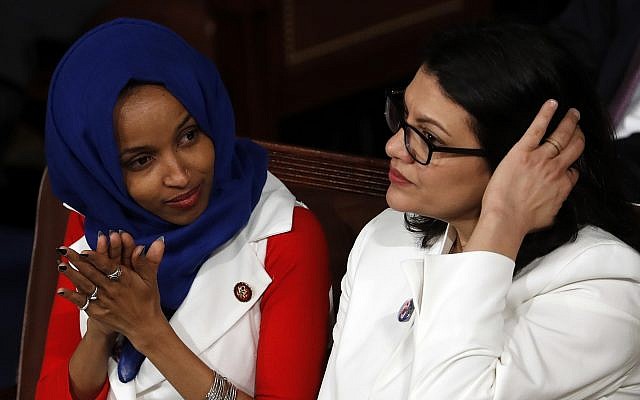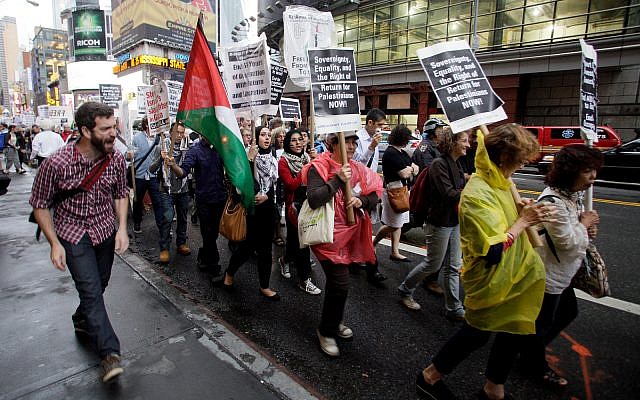Democratic congresswomen would be denied entry under 2017 boycott law, but Netanyahu can decide to waive the rule

Prime Minister Benjamin Netanyau will decide whether US congresswomen Omar Ilhan and Rashida Tlaib will be allowed to enter Israel and the West Bank next month, Haaretz reported Wednesday.
Ilhan told the Jewish Insider on Wednesday that she and Tlaib were planning to visit Israel and the West Bank in “a few weeks,” but the trip could be nixed by Jerusalem over their support for the Palestinian-led anti-Israel boycott movement.
Both Omar, a Somali-born lawmaker from Minnesota, and Tlaib, the first-Palestinian-American woman to be elected to Congress, have been accused of harboring anti-Israel sentiment, in part due to their support for the Boycott, Divestment and Sanctions movement.
Omar on Tuesday introduced a resolution cosponsored by Tlaib aimed at pushing back against laws seeking to clamp down on boycotts of Israel. The resolution, which does not explicitly mention Israel or the pro-Palestinian BDS movement, affirms the right of Americans to participate in boycotts as an expression of free speech under the First Amendment, citing boycott movements against Nazi Germany, the USSR and apartheid South Africa.
Omar, Tlaib and other BDS supporters say that in urging businesses, artists and universities to sever ties with Israel, they are using nonviolent means to oppose unjust policies toward Palestinians. Israel says the movement masks its motives to delegitimize or destroy the Jewish state.

In 2017, Israel enacted a controversial law barring entry to any foreigner who “knowingly issues a public call for boycotting Israel.”
Since then, the Interior and Strategic Affairs ministries have used the law to deny visas to a handful of students, activists and artists upon their arrival to Israel.
The Foreign Ministry can recommend the law be waived for visiting politicians or government officials out of diplomatic concerns; however, due to the sensitive nature and timing of Omar and Tlaib’s visit, the Haaretz daily reported Wednesday the final decision will be made by Netanyahu.
Omar was accused of anti-Semitism earlier this year after she said that American support for Israel was driven by money from a pro-Israel lobbying group.
Similar accusations of anti-Semitism were leveled against Tlaib in May, when she claimed that Palestinians were involved in creating “a safe haven for Jews” after the Holocaust.
Omar has expressed support for the two-state solution to the Israeli-Palestinian conflict, though Tlaib says she supports a single state formula.
Omar and Tlaib, the only Muslim women in Congress, have been thrust into the spotlight again this week as two of the four lawmakers targeted by US President Donald Trump in racist tirades. In a series of incendiary tweets, the president urged Omar, Tlaib, Alexandria Ocasio-Cortez and Ayanna Pressley to “go back” to their countries of origin. All are American citizens and all except Omar, who is of Somali origin, were born in the United States.
Despite the mounting backlash, the president made clear that he has no qualms about exploiting racial divisions in his reelection campaign, and has remained defiant in attacking the women, accusing them of being “anti-Semitic” and “anti-American.”

On Monday, he singled out Omar, accusing her of having “hatred” for Israel and expressing “love” for “enemies like al-Qaeda.”
“These are people that, in my opinion, hate our country,” he said of the lawmakers.
Later, he accused the Democrats of pushing a radical anti-Israel political agenda ahead of the 2020 elections.
“The Dems were trying to distance themselves from the four ‘progressives,’ but now they are forced to embrace them,” Trump tweeted Monday afternoon. “That means they are endorsing Socialism, hate of Israel and the USA! Not good for the Democrats!”
On Wednesday, Trump egged on a crowd of his supporters at a North Carolina campaign with chants of “send her back” directed at Omar.
“The way they speak so badly of our country,” Trump told his supporters, decked out in the colors of the US flag and “Make America Great Again” caps. “They want to demolish our constitution. Eliminate the values that built this magnificent country.”
As reported by The Times of Israel
